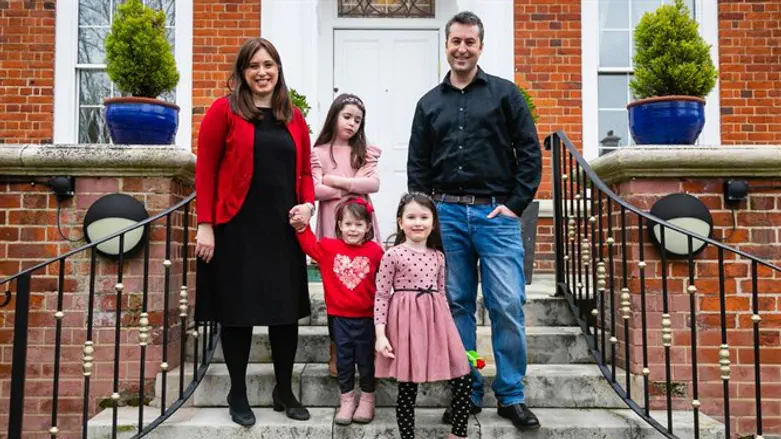
Israeli Ambassador to Britain Tzipi Hotovely spoke to the Besheva newspaper Wednesday about the transition process and relocating her family from Israel to London.
"There is a myth in the Foreign Ministry called the miracle of Hanukkah," Hotovely explains to correspondent Hadas Tzuri.
"Diplomats are always told to take into account that the first three months are very difficult: the children cry in the morning and evening from homesickness, they do not understand the language and have no friends. Three months after the beginning of the school year, Hanukkah comes and the miracle occurs: the children learn the local language," she says.
However, this miracle did not occur for them due to the coronavirus pandemic, which kept Hotovely's three daughters home instead of in school.
"Although when we arrived here on Sukkot the schools were open and we were very happy. Our main concern in this transition was of course the girls. We enrolled them in a Jewish and very Zionist school. The teachers are Israeli, speak Hebrew in the classrooms, and we calmed down. But then the British variant of the coronavirus was discovered and the country began to close before their eyes. Schools were closed all at once for three months. All the acclimatization difficulties we went through in the first two months when schools were open, the longing for Israel and the crying at night, were repeated.
Hotovely notes that while the ambassadorship to Britain is highly prestigious, it is a position which comes at a high price, and Prime Minister Netanyahu had to convince her to accept it.
"We have an important mission to represent Israel and advance its affairs, but we pay a very heavy family price for it when we move the center of our lives and the lives of our daughters from Israel, especially in the corona period where there is a special difficulty. When we arrived, the girls said they wanted to return immediately. Eliraz, my middle child, asked me: How can one live in a country without sun?
"We, and especially [my husband] Or, had a big dilemma whether to take on the task. Prime Minister Netanyahu personally called Or to convince him. He talked to him at length about Britain's importance in the international arena, explaining how important the task was nationally and how important it was for him to take the job. In addition, he shared with us his experiences as a child, when his family moved to the United States following his father's work as a professor. He noted that he owes his fine English to these years.
But it is not the prime minister's fine English that convinced them to bear the price of moving to England. "What made us make the decision is the importance of this mission. After four years in the Foreign Ministry I know very well how much diplomacy shapes our ties with the world and what impact it has on both security and the economy. Unfortunately, the diplomatic field is not valued enough. I I see this role as one of my professional peaks in the mission for Israel."
Hotovely says that the first senior diplomats she met in the first week of her arrival were not British officials but rather the Arab ambassadors of the United Arab Emirates, Bahrain and Morocco. "I chose to meet with them, because I saw that strong momentum was created following the Abraham Accords. I was received by them with a warm and exciting welcome. These meetings showed me how warm and real this peace is."
She says that her British hosts shared this enthusiasm for the Abraham Accords. Hotovely, as the new Israeli ambassador, was invited together with the UAE ambassador and the ambassador of Bahrain to many performances and events. "We were in high demand," she laughs. "We were the wandering triangle: we were invited to perform before the academic staff and seniors at Cambridge, the Jewish community invited us to an exciting Hanukkah event where we lit candles, another research institute asked to host us and more. There is great enthusiasm that the Middle East is changing and you can really feel the wings of history."
The religious issue is usually not central to diplomatic work in Britain, but it is precisely in meetings with the two Arab ambassadors that the religious issue has found significant expression. "They both talked to me about promoting interfaith ties. In Bahrain there is a Jewish community that they are very proud of. The ambassador gave me a book about this community as a gift, and the UAE ambassador invited me to open the Abraham Tent - a new project in Dubai uniting the three main religions. "Synagogue, mosque and church. It is important for them to create an interfaith connection and it is charming."
When asked about the decision of the International Criminal Court to investigate Israel for alleged war crimes, Hotovely says: "The issue of the International Court of Justice in The Hague is very preoccupying for us as ambassadors. I have discussed the issue with the British Foreign Secretary and our Foreign Minister has also spoken to him about it. We are sending a very sharp message and making it clear that an incorrect legal decision has been made, which is a political and illegitimate decision. There will be prices for this decision. "